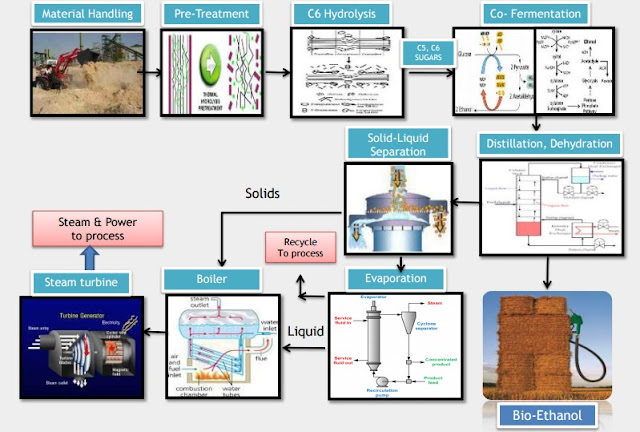Praj starts up its demo biorefinery based on Enfinity technology
Last December, the Blog reported about several agreements
to set up cellulosic ethanol biorefineries in India (see post).
Praj participates in three of them as technology
partner of two Oil Marketing Companies (BPCL and IOCL). Its second generation
ethanol platform is called Enfinity and it is based on an integrated
biorefinery approach. The company has just announced the achievement of an
important milestone regarding to the scale up of the technology: the successful
completion and start-up of its “smart biorefinery” at demonstration scale (see press release).
In 2009, Praj inaugurated the Cellulosic
Ethanol Pilot Plant at Praj Matrix (R&D centre in Urawade). Pilot plant
trials validated work done at laboratory scale. Continuing its effort in
bringing new technologies to the ethanol industry, it decided to scale up the
pilot plant and built a 2G commercial demo plant in 2012. According to some
references, the commissioning had been targeted by 2nd half 2014. However, it
is now when has been implemented.
This 2G ethanol demo plant can produce 1 ML per
year of ethanol by processing a variety of agriculture residues like rice and
wheat straw, cotton stalk, cane trash and corn cobs and stover. The process is highly
energy efficient and is equipped with zero liquid discharge system. Also, other
renewable fuels and chemicals are expected to be produced through this
technology platform. Experts from the Oil Marketing Companies and their
engineering consultants have already visited the demo plant and endorsed the
success of Praj’s technology.
Figure 1. Praj process block diagram (extracted
from the presentation “Biomass to
Bioethanol - Second Generation Technology by Praj”, February 2016)
Talking about this achievement, Mr. Pramod
Chaudhari (Executive Chairman at Praj) said: “Commercialization of 2G ethanol
technology will give an impetus to rural economy and create additional
employment opportunities. The menace caused by burning of farm residue can be addressed
effectively by converting biomass into ethanol to be used as a transportation
fuel. Progressively increased ethanol blending will help achieve GHG emission
reduction targets agreed at COP 21 Paris summit.”
In India, an ecosystem for 2G ethanol is in the
making to attain the aspired 20% blend ratio. As a part of this drive, several 2G
ethanol projects are expected to be finalized with average CAPEX of around Rs
600 crore (approx. 85 M€). Each of these plants will have the capacity to
produce 100,000 litre ethanol per day. Praj’s smart biorefinery technology
paves the way for stepping up this ethanol blending program.





